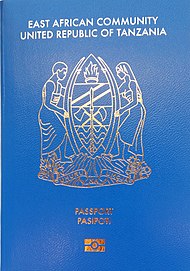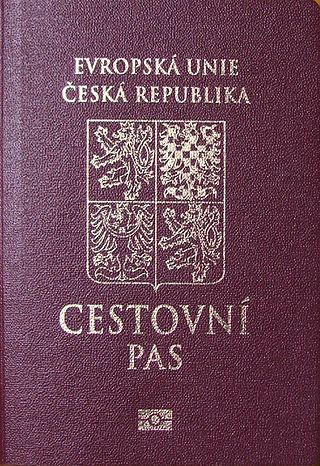
The Czech passport is an international travel document issued to nationals of the Czech Republic, and may also serve as proof of Czech citizenship. Besides enabling the bearer to travel internationally and serving as indication of Czech citizenship, the passport facilitates the process of securing assistance from Czech consular officials abroad or other European Union member states in case a Czech consular is absent, if needed.

Hungarian passports are issued to Hungarian citizens for international travel by The Central Data Processing, Registration and Election Office of the Hungarian Ministry of the Interior. Every Hungarian citizen is also a citizen of the European Union. The passport, besides the national identity card allows for free rights of movement and residence in any of the states of the European Union, European Economic Area and Switzerland.

Croatian passport is issued to citizens of the Republic of Croatia for the purpose of international travel. The passport has the purpose of serving as proof of Croatian citizenship and identity. Responsibility for their issuance lies with the Ministry of the Interior; and for citizens abroad, passports are issued by the local embassy or consulate. Croatian passports are valid for ten or five years, and are not renewable. Every Croatian citizen is also a citizen of the European Union. The passport, along with the national identity card allows for free rights of movement and residence in any of the states of the European Economic Area and Switzerland.

The Thai passport is the passport issued to citizens and nationals of Thailand by the Passport Division of the Department of Consular Affairs within the Ministry of Foreign Affairs. Thai biometric passports have been issued since August 2005.

Mexican passport is the passport issued to Mexican citizens for the purpose of travelling abroad. The Mexican passport is also an official ID and proof of Mexican citizenship. According to the January 2024 Henley Visa Restrictions Index, holders of a Mexican passport can visit 161 countries without a visa, placing Mexico in the 23rd rank in terms of global travel freedom.

Mauritian passports are issued to citizens of Mauritius for travel outside the country. As of 2007, Mauritius' Passport and Immigration Office processed an average of 434 passport applications each day.

The Montenegrin passport is the primary document for international travel issued by Montenegro.

A Panamanian passport is the passport issued to citizens of Panama to facilitate international travel. Panamanian citizens enjoy visa-free access to 118 countries and territories. The passports are issued by the Passports Authority of Panama.
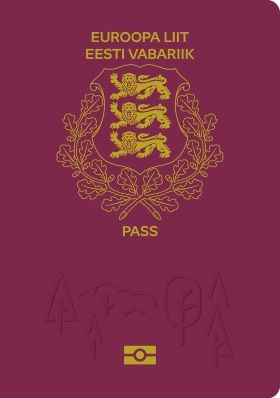
An Estonian passport is an international travel document issued to citizens of Estonia, and may also serve as proof of Estonian citizenship. Besides enabling the bearer to travel internationally and serving as indication of Estonian citizenship, the passport facilitates the process of securing assistance from Estonian consular officials abroad or other European Union member states in case an Estonian consular is absent, if needed. If an Estonian citizen wishes to receive an identity document, especially an Estonian passport, somewhere other than the foreign representation of the Republic of Estonia, then the bearer of the Estonian citizenship staying abroad could receive the travel documents in embassies of any EU country worldwide by paying 50 Euro. Many countries require passport validity of no less than 6 months and one or two blank pages.

Egyptian passports are issued to nationals of Egypt for the purpose of international travel. Besides serving as a proof of Egyptian citizenship, they facilitate the process of securing assistance from Egyptian consular officials abroad if needed. Egyptian passports are valid for seven years for adults, and is issued for lesser periods for school or college students, or those who have not finalized their status of the military conscription. Starting in 2008, The Egyptian government introduced newer machine-readable passport (MRP), in order to comply with international passport standards and requirements with 96.7% conformance to ICAO Document 9303. The newer passports offer better security and state-of-the-art anti forging parameters and have a soft cover.
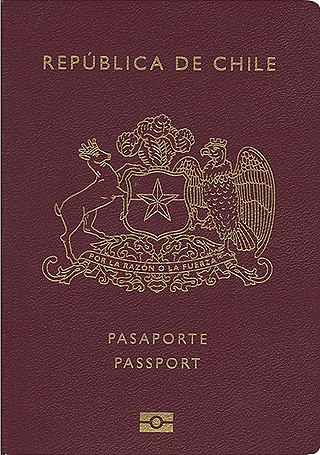
A Chilean passport is an identity document issued to citizens of Chile to facilitate international travel. Chilean passports are valid for worldwide travel and facilitate the access to consular services whilst abroad. They are issued by the Registro Civil e Identificación.

A Dutch passport is an identity document issued to citizens of the Kingdom of the Netherlands for the purpose of international travel. As the Netherlands only distinguish one category of citizen, for all countries in the Kingdom, passports are the same for all four countries. The passport also serves as a means of identification as required by the Dutch law since 1 January 2005 for all persons over the age of fourteen. Dutch passports are valid for a period of ten years from issuing date. The passport complies with the rules for European Union passports. Since 26 August 2006 all passports are issued as a biometric passport with an embedded contactless smartcard RFID chip for storing biometric data. Every Dutch citizen is also a citizen of the European Union. The nationality allows for free rights of movement and residence in any of the states of the European Union, European Economic Area, and Switzerland.

Latvian passports are issued to citizens of Latvia for identity and international travel purposes. Receiving a valid passport is mandatory from the age of 15, but passports can be requested for younger children if needed for travel and other purposes. A passport is valid for 10 years if the citizen is 20 or older, for 5 years if 5–20 and for 2 years if 0–5 years old. Non-citizen passports, and refugee travel documents, have been issued until 2020. Every Latvian citizen is also a citizen of the European Union. The passport, along with the national identity card, allows Latvian citizens to travel and to have rights of free movement and rights to reside in any states of the European Union, European Economic Area and Switzerland.

A Moldovan passport is an international document issued to citizens of the Republic of Moldova for the purpose of international travel. The passport is issued by the Public Services Agency and by Moldovan foreign representations abroad. The passport is valid for ten years. For children under the age of seven years it is valid for four years. Since 1 January 2006, Moldovan citizens can hold two passports simultaneously, providing a written request has been submitted to local passport office.

North Macedonian passports are issued to citizens of North Macedonia for the purpose of international travel. Responsibility for their issuance lies with the Ministry of the Interior. The validity of the passport is 5 years for persons 4 to 27 years of age and 10 years for those 27 years of age and older. For children ages four and under, the validity of the passport is limited to two years. The passports conform to the recommended standards of the International Civil Aviation Organization (ICAO), and are biometric passports.

The Albanian passport is a travel document issued by the Ministry of Interior to Albanian citizens to enable them to travel abroad. They are also used as proof of identity within the country, along with the Albanian ID card.

The Kenyan passport is issued to Kenyan citizens in accordance with the Constitution of Kenya, 2010 and as provided for in the Kenya Citizens and Immigration Act that commenced on 30 August 2011. In addition issuance process is regulated by Legal Notice No. 64. If eligible, an individual can apply for a New Passport, Renewal Passport and Replacement Passport. Passports are issued by the Department of Immigration. The department is under the Ministry of Interior and Coordination of National Government. Kenyan passports are usually used as a form of ID as well and would be rated as second to the Kenyan national ID card. Before Kenya got independence from Britain, British passports were used.

The Azerbaijani passport is issued by the Ministry of Internal Affairs of Azerbaijan to the citizens of Azerbaijan for international travel. Ordinary passports are valid for 10 years from the date of issue and contain 34 visa pages. Passport content is printed both in Azerbaijani and in English.

A Nepali passport is issued from the Ministry of Foreign Affairs of the Nepal to Nepali citizens for the purpose of international travel. The Department of Passport (DoP), a Department under Ministry of Foreign Affairs functions as the issuing authority and is responsible for issuing Nepali passports on application to all eligible Nepali citizens. It enables the bearer to travel internationally and serves as proof of Nepali citizenship.
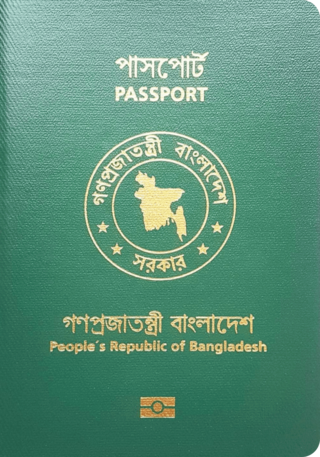
The passport of Bangladesh is an ICAO compliant, machine-readable and biometric e-passport issued for the purpose of travel to foreign countries by the passport holder. Bangladesh is the first country in South Asia to issue e-passports for all eligible citizens. The passport booklet is manufactured, printed and issued by the Department of Immigration & Passports of the Ministry of Home Affairs. This electronic microprocessor chip embedded e-passport has forty-one different security features, including holographic images embossed in thin-film laminate, which change colour under light and appear to move. Demographic and biometric information of the e-passport holder are stored on the chip inside the e-passport. This information includes the fingerprints of all ten fingers of the passport holder; the iris scan of both eyes; a color photograph of the face of the bearer; their digital signature; etc. Depending on the age of the applicant, the e-passport is valid for either five years or ten years and it is distributed by the Government of The People's Republic of Bangladesh, or by any of its overseas diplomatic missions, to eligible Bangladeshi nationals who are citizens by birth, by descent or through naturalization.
